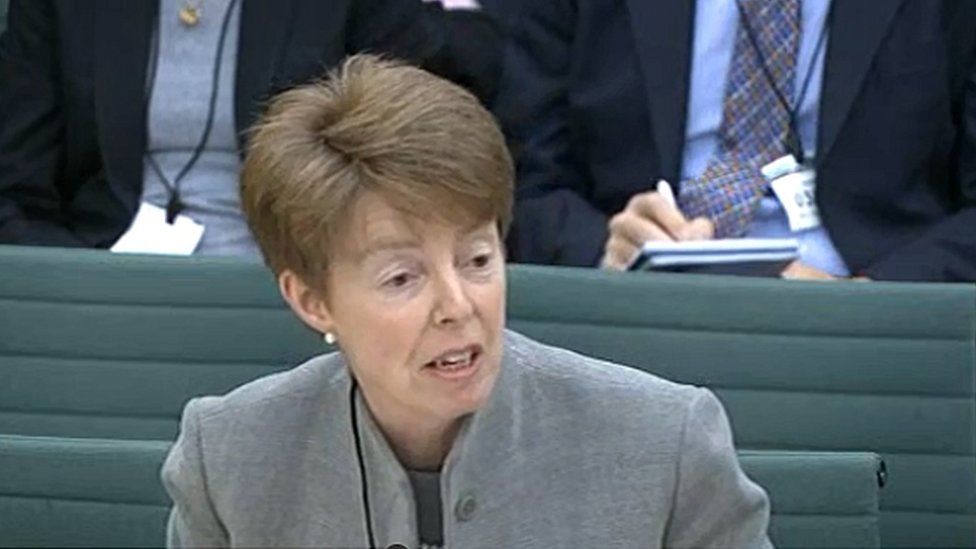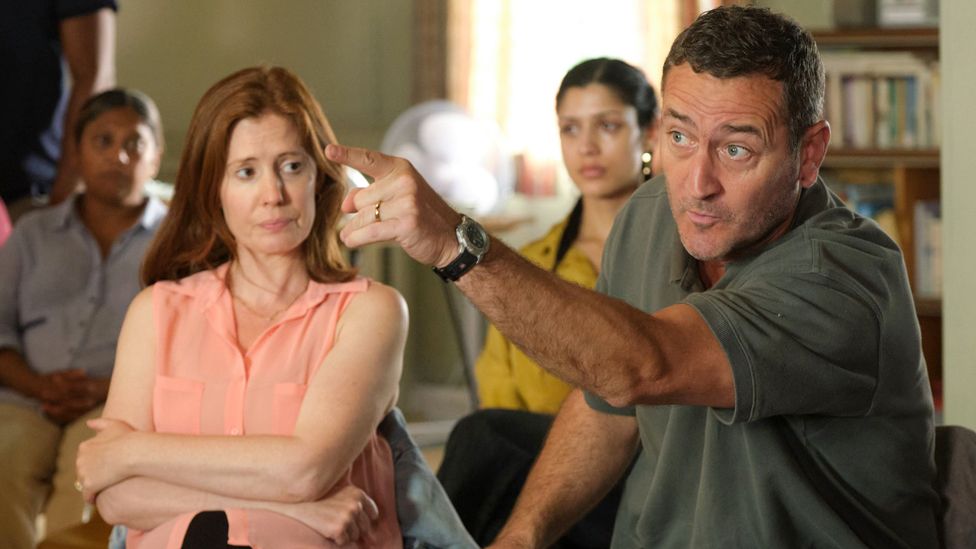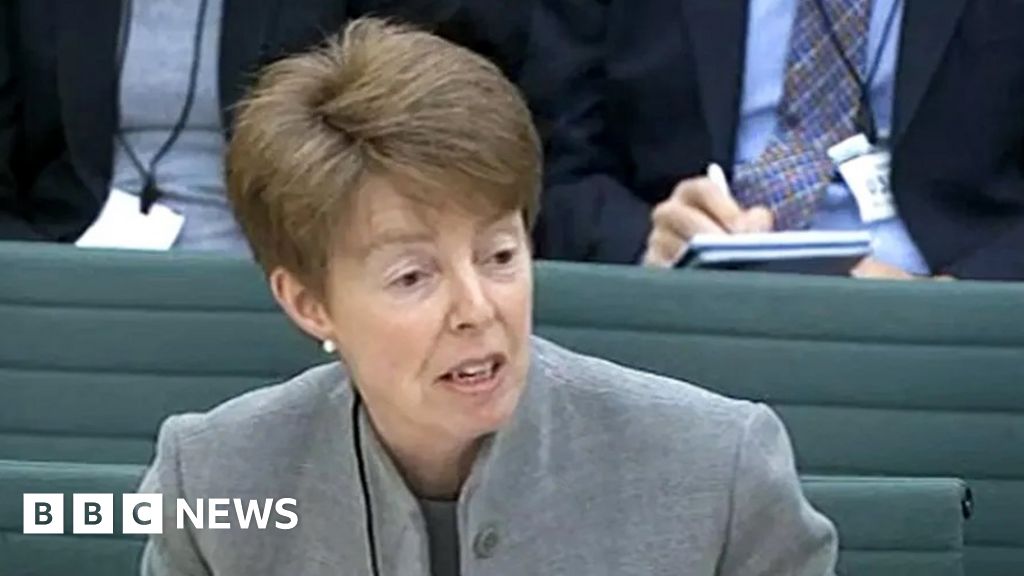
Former Post Office boss Paula Vennells is handing back her CBE with immediate effect after facing mounting pressure over the Horizon IT scandal.
More than 700 sub-postmasters were prosecuted based on information from faulty software.
Some people went to prison for false accounting and theft, while many were financially ruined.
More than a million people have signed a petition calling for her to hand back her CBE.
In a statement, Ms Vennells said she had “listened” to the sub-postmasters and others calling for her to return her CBE.
“I am truly sorry for the devastation caused to the sub-postmasters and their families, whose lives were torn apart by being wrongly accused and wrongly prosecuted as a result of the Horizon system.”
Ms Vennells has long faced questions over her role in the scandal, which has been described as one of the most widespread miscarriages of justice the UK has seen.
She was Post Office chief executive between 2012 and 2019, and received the CBE for services to the Post Office and to charity.
More than 700 Post Office branch owner-operators were wrongly prosecuted for theft, fraud and false accounting between 1999 and 2015 on the basis of faulty information from Horizon software.
Ms Vennells was included in the New Year’s Honours list in 2019 despite ongoing legal action against Post Office, which was launched by 555 sub-postmasters in 2017.
Post Office said the honour was given for her work on “diversity and inclusion”, and her “commitment to the social purpose at the heart of the business and her dedication in putting the customer first”.
However, despite the offer by Ms Vennells, the only person who can strip someone of an honour is King Charles.
People can indicate they would like to renounce their honour, as Ms Vennells has now done – but doing so has no formal effect. Until the King is advised by the Forfeiture Committee and acts on its advice, Ms Vennells will continue to hold her CBE.
The Communication Workers Union (CWU), which represents 110,000 Royal Mail employees, said Ms Vennells’ decision was “a token gesture”.
CWU’s national officer Andy Furey said: “Holding such a distinction for services to the Post Office was always a slap in the face to every postmaster who suffered terribly under her leadership.”
Mr Furey also called for Ms Vennells to return performance-related bonuses she received during her role at Post Office.
He said: “Since she received these bonuses while overseeing the most widespread miscarriage of justice in British history, it would only be right to return this money.
Many victims of the scandal – which began in 1999 – are still fighting to have their convictions overturned or to secure full compensation after being forced to pay out thousands of pounds of their own money for shortfalls that were caused by Horizon accounting software.
Jo Hamilton, a former subpostmistress who was wrongly convicted in 2008 of stealing thousands of pounds from a village shop in Hampshire, said she was glad Ms Vennells had agreed to return the honour.
“It’s a shame it took just a million people to cripple her conscience,” she said.
Varchas Patel, whose father Vipin was wrongfully convicted of fraud in 2011 after being accused of stealing £75,000 from his Post Office branch in Oxford, said Ms Vennells did not deserve her honour.
Mr Patel told the PA news agency: “My initial reaction is good, I’m glad. She doesn’t deserve that CBE, she never did deserve that CBE.”
Ms Vennells joined the Post Office in 2007, and was promoted to the position of chief executive in 2012.
She held the top job until February 2019, when she stepped down. During her tenure, the company repeatedly denied there were problems with its IT system, Horizon.
A government source told PA news agency that Ms Vennells agreeing to hand back her CBE was “the right thing to do”.
Downing Street has said it is “obviously the right decision” for Ms Vennells to return her CBE.
Number 10 has also said it would support “further recognition” of the work of sub-postmaster Alan Bates and others to expose the Horizon scandal.
The prime minister’s official spokesman said: “Both Mr Bates and many others deserve huge amounts of praise for the tenacity and dedication they have shown in exposing this scandal.
“It’s right that that is recognised and we would support further recognition of that.”

A CBE (Commander of the British Empire) is awarded to someone who has gone “above and beyond for the community or country”.
After a damehood or knighthood, it is the highest level of Order of the British Empire, and is followed by the OBE (Officer of the Order of the British Empire), then the MBE (Member of the Order of the British Empire).
Until 2012, the Post Office was part of Royal Mail before it was split off. Between 2003 and 2010, Adam Crozier was chief executive of Royal Mail. He went on to lead ITV and is now chairman of BT.
He was replaced by Dame Moya Greene who ran Royal Mail for eight years, during which time the company was privatised and listed on the London Stock Exchange in 2013.
On Tuesday Justice Secretary Alex Chalk said the idea of using legislation to quash convictions of all Post Office workers caught up in the scandal was under “active consideration”.
In the Commons on Tuesday, former minister Nadhim Zahawi – who made an appearance playing himself in the recent ITV drama Mr Bates vs the Post Office – called for a “simple bill” to quash all the remaining convictions based on “bad data”.
“Until those convictions are overturned the victims cannot claim compensation,” Mr Zahawi said.
In response, Mr Chalk said the issue was “an appalling injustice” and Mr Zahawi’s suggestion was “receiving active consideration”.
Other senior figures to call for legislation to speed up the process of overturning the convictions include Labour peer Lord Falconer, who was justice secretary under Tony Blair, and former Conservative Justice Secretary Sir Robert Buckland.
However, others have disagreed, including former attorney general Dominic Grieve who told the BBC that it would amount to “parliamentary interference in the judicial process”.
Instead, he said each case “ought to be considered on its own merits”, and sent to the Criminal Cases Review Commission (CCRC), which investigates alleged miscarriages of justice.
The scandal has been described as the most widespread miscarriage of justice in British history, but to date only 93 convictions have been overturned and of them, just 30 people have agreed “full and final” compensation settlements, meaning many victims are still fighting to clear their names.
Some 54 cases have resulted in either a conviction being upheld, people being refused permission to appeal, or the person appealing having withdrawn from the process.
While the scandal has been public knowledge for some time with a public inquiry ongoing, an ITV drama – Mr Bates vs The Post Office – which aired last week thrust the issue back into the spotlight.
